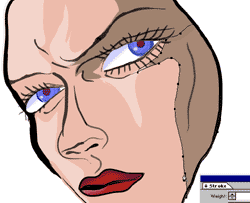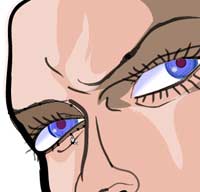|
Step Four: Face Colors
|
Create Skin Tone
First off we should create a new Layer set. Call it Face Plate Colors
or such. It should be below the Facial Lines layer.
First thing to do is select and copy the head outline (The very first
stroke we made in this entire illustration). Deselect the stroke, then
get on your Face Plate layer and EDIT-->PASTE IN FRONT. We do this so
we can preserve the initial facial outline.(We might make slight changes
to it later on).
We don't need the stroke, but rather the fill. We can turn off this new stroke for now. (We are using this for fill purposes only right now so you can click on the object and then set it to have "no stroke" in the main toolsbar).
Now we will choose her main skintone color.
With the object still selected, pick the color you want the face to be by double clicking
the fill color picker box. I used #EDBBAB. Save this color in your swatches
pallette and name it 'Skintone'. 
Note: For some reason I called my duplicate head path layer "head
path from other". It probably would make more sense as "HeadPath
Copy".
|
Highlights
|
| NEW LAYER-->Highlights (Organization is important with this
many components). |
| Highlighting the subject is a simple matter of choosing a
lighter shade of your midtone, and shading the proper areas of the face.
Choosing the color is the easy part: |
|
Deselect everything and make sure yor stroke is set
to none. Now click on the fill box and assign your swatch color 'Skintone'
to the fill box.(We want to take our original skin color, and modify it to a slightly lighter shade). Now double click on the fill box to edit it. Simply choose
a lighter shade than your original 'Skintone' and click ok (I used #F7E2DC).
Once again drag your fill box into the swatches pallette and name your
new color 'Skin Highlight'. This is basically the same color as the main skin color, only a little lighter.
|
| The next step is to highlight the proper areas. I think
that using the pen tool is the easiest way. We are going to want to
highlight mostly 'her' right side. First I gave her a highlight on
the forehead. Then I did her right cheek area. |
|
|
 |
Try to work with the existing facial lines
as you draw your paths. In other words, let your shapes harmonize
with your lines, curving in similair directions but not necessarily
exactly the same. I put 2 more shapes on for a total of 4. You can
experiment with different shapes on different areas for varying effects. |
|
| |
|
 |
| Once you are satisfied with
the highlights, we can move on to the shadows. |
|
Shadows
|
| NEW LAYER-->Shadows |
|
Again, pick the color you are going to use, and save it in your swatch
pallette as 'Skin Shadow' (I used #A0826E). As with the highlights, we will use the original skin color, and modify its lightness. With nothing selected, assign the 'Skintone swatch as the fill color. Double click the fill color box and alter it to a darker shade. This is the secret of shadows. They will carry the same actual color as the midtone, but with less reflective energy(darker tone).
Let us take a moment to think about where shadows might be found. Perhaps
behind protruding areas such as the nose and lip? Maybe in places that
are set deeper back such as the eye socket area? The opposite side of
the face from the highlights? Good thinking!
|
| Let's start with the top-right side of
the face. Start drawing your path with the pen or pencil
tool. Work your way from the right one-third of the forehead and draw
a shadow that curves close to the eyebrow, and covers most of the
upper eye area. Don't forget to work with your existing facial lines
to draw your shapes. |
 |
|
 |
Next we can do the rest of the side opposite of the
highlights. |
|
| Now put a shadow under her other eyesocket,
since that is bound to have one. |
 |
|
| Dont forget the other places that are important
such as around the nose and lips. Keep them placed underneath the
top and to the right of your features, since that is our shadow side
of the face.(This particular arrangement would suggest a light source from "her" right side and slightly above). Film Noir anyone? |
 |
|
|
Once you get the shadows, we are done with this section!
|
| Once again, the final should look something
like this: |
 |
|
| |